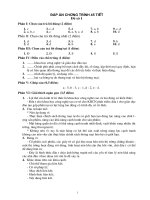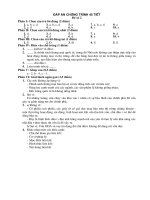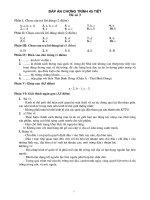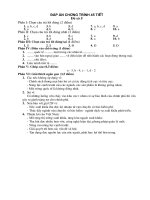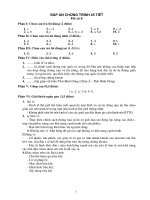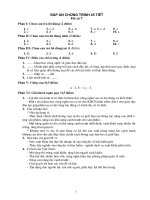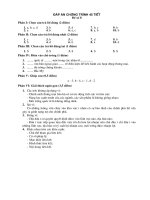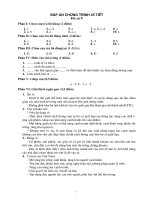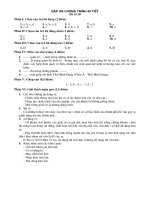BÀI TẬP BỔ TRỢ TIẾNG ANH 7 GLOBAL SUCCESS (KHÔNG ĐÁP ÁN)
Bạn đang xem bản rút gọn của tài liệu. Xem và tải ngay bản đầy đủ của tài liệu tại đây (1.71 MB, 124 trang )
BÀI TẬP BỔ TRỢ
TIẾNG ANH 7
GLOBAL SUCCESS
UNIT 1.HOBBIES
A. VOCABULARY
No.
Word
Part of
speech
1
2
3
4
5
6
7
8
9
Arrange
Benefit
Bird-watching
Board games
Bored (with)
Bug
Carve
Cheap
Clay
v
n
v
n
adj
n
v
adj
n
10
Collage
n
11
12
13
14
15
16
17
18
19
20
21
22
23
24
25
26
27
28
29
30
31
32
33
Collect
Competition
Cost
Decorate
Defeat
Display
Foreign
Game (against)
Glue
Good (at)
Interest
Lyric
Melody
Model
Nature
Opponent
Patient
Photo
Present
Pursue
Receive
Save = protect
Set
v
n
v
v
v
v, n
adj
n
n
adj
n
n
n
n
n
n
adj
n
n
v
v
v
v
Pronunciation
/əˈreɪnʤ/
/ˈbenɪfɪt/
/bɜːd-ˈwɒʧɪŋ/
/bɔːd geɪmz/
/bɔːd (wɪð)/
/bʌg/
/kɑːrv/
/ʧiːp/
/kleɪ/
/ˈkɒlɑːʒ/
/kəˈlɛkt/
/ˌkɒmpɪˈtɪʃən/
/kɒst/
/ˈdekəreɪt/
/dɪˈfiːt/
/dɪˈspleɪ/
/ˈfɒrən/
geɪm (əˈgeinst)
/ɡluː/
/ɡʊd/
/ˈɪntrəst/
/ˈlɪrɪk/
/ˈmelədi/
/ˈmɒdl/
/ˈneɪtʃə(r)/
/əˈpəʊnənt/
/ˈpeɪʃnt/
/ˈfəʊtəʊ/
/ˈpreznt/
/pəˈsjuː/
/rɪˈsiːv/
/seɪv = prəˈtekt/
/set/
Meaning
Sắp xếp, sắp đặt, cắm
Lợi ích
Ngắm chim
Trị chơi trên bàn cờ
Chán (cái gì)
Con bọ
Điêu khắc
Rẻ
Đất sét
Một bức tranh tạo thành từ nhiều
tranh, ảnh nhỏ
Sưu tập, thu thập
Cuộc thi
Tốn (tiền), có giá
Trang trí
Đánh bại
Trưng bày, sự trưng bày
Nước ngồi
Trận đấu (để đấu lại ai)
Keo dán, hồ dán
Giỏi (về)
Sở thích
Lời bài hát
Giai điệu
Mơ hình
Tự nhiên, thiên nhiên
Đối thủ
Kiên nhẫn
Bức ảnh
Món q
Theo đuổi
Nhận
Bảo vệ
(Mặt trời) lặn
34
35
36
37
38
39
40
Sew
Stress
Surf (the Internet)
Unique
Usual
Valuable
Wood
v
n
v
adj
adj
adj
n
/səʊ/
/stres/
/sɜːf (ði ˈɪntəˌnet)/
/juˈniːk/
/ˈjuːʒuəl/
/ˈvỉljuəbl/
/wʊd/
May vá
Sự căng thẳng
Lướt (mạng)
Độc đáo
Bình thường
Quý giá
Gỗ
B. PRONUNCIATION
Nguyên âm đơn dài
/ɜː/
Nguyên âm đơn ngắn
/ə/
e (prefer), ea (learn), i (first), u (nurse), o (word), ou (journey)
a (about), e (open), o (compare), u (future), ou (famous)
C. GRAMMAR
I. The present simple (Thì hiện tại đơn)
1. Forms (Cấu trúc)
Động từ thường
Động từ “to be”
Câu
S + Vs/es
S + am/ is/ are + N/ adj/ prep
khẳng định
E.g: He watches TV every day.
E.g: My mother is a teacher
Câu
S + do/ does not + V-inf
S + am/ is/ are not + N/ adj/ prep
phủ định
E.g: I don ’t like cakes.
E.g: I’m not a student.
Do/ Does + S + V-inf?
Am/ Is/ Are + S + N/adj/prep?
(+) Yes, S + do / does.
(+) Yes, S + is / am / are.
Câu
(-) No, s + don’t / doesn’t.
(-) No, S + is / am / are + not.
nghi vấn
E.g: Do you like playing chess?
E.g: Are you sure?
- No, I don ’t.
- Yes, I am.
2. Use (Cách dùng)
Diễn tả sự thật, chân lý hiển nhiên
E.g: The sun rises in the East.
Diễn tả sở thích, thói quen
E.g: I often get up at six o ’clock.
Diễn tả cảm xúc, cảm giác
E.g: She likes singing.
Diễn tả sự di chuyển có lịch trình
E.g: The plane takes off in 5 minutes.
3. Add s/es to the verbs (Quy tắc thêm đuôi s/es vào sau động từ)
Động từ tận cùng là o, s, x, z, ch, sh, ss 🡪 thêm -es
E.g: wash 🡪 washes
Động từ tận cùng là phụ âm + y, bỏ -y 🡪 thêm -ies
E.g: carry 🡪 carries
Các động từ còn lại 🡪 thêm s
E.g: learn 🡪 learns
Các động từ đặc biệt
E.g: have 🡪 has
4. Spelling rules (Quy tắc phát âm đuôi s/es)
Phát âm là Từ có tận cùng là các phụ âm /f/, /t/, /k/, /p/, /ð/ (thường E.g: walks /wɔ:ks/
/s/
có tận cùng là các chữ cái gh, th, ph, k, f, t, p)
Phát âm là Từ có tận cùng là các âm /s/, /z/, /ʃ/, /tʃ/, /ʒ/, /dʒ/ (thường E.g: boxes /'bɒksiz/
/iz/
có tận cùng là các chữ cái x, z, s, ss, sh, ch, ce, ges)
Phát âm là
E.g: chickens /'tfikinz/
/z/
Các trường hợp còn lại (b, d, g, l, m, n, ng, r, v, y, ...)
* Lưu ý: cách phát âm phải dựa vào phiên âm quốc tế, không dựa vào cách viết.
5. Time expressions (Dấu hiệu trạng ngữ thời gian)
💧 Every + khoảng thời gian (every day/ week/ month/ year, ...)
💧 Once/ twice/ three times/ four times + a/per + khoảng thời gian (once a day/ week/ month/ year, ...)
💧 In the + buổi trong ngày (in the morning, ...)
💧 Trạng từ chỉ tần suất:
+ Đứng trước động từ chính
E.g: I often play soccer. (Tơi thường chơi hóng đá.)
+ Ngoại lệ: Đứng sau to be (am/ is/ are) trong thì hiện tại tiếp diễn
E.g: She is always late. (Cô ta cứ đến muộn mãi.)
100%
Always
Ln ln, lúc nào cũng, suốt, hồi
90%
Usually
Thường xuyên
80%
Generally
Thông thường, theo lệ
70%
Often
Thường
50%
Sometimes
Thỉnh thoảng
30%
Occasionally
Thỉnh thoảng, đôi khi
10%
Hardly ever
Hầu như, hiếm khi
5%
Rarely
Hiếm khi, ít khi
0%
Never
Không bao giờ
II. Expressing liking & disliking (Diễn đạt sự u thích / khơng u thích)
Liking
Disliking
Adjectives be fond of
be disgusted with
be keen on
be interested in
be into
be addicted to
be fascinated by
be crazy about
be mad about
Nouns
big fan of
hate for
passion for
hatred for
Verbs
adore
can't bear
enjoy
can't put up with
fancy
can't stand
like (Ving/ to V)
can't tolerate
love (Ving/ to V)
detest
prefer (Ving/ to V)
dislike
* prefer Ving to Ving
hate (Ving/ to V)
loathe
mind
Examples - Lucy adores collecting stamps.
We dislike doing exercises every
- I am keen on playing the violin.
morning.
He hates playing table tennis.
D. PRACTICE
PART 1. PHONETICS
Exercise 1. Find the word which has a different sound in the underlined part.
1. A. bird
B. girl
C. first
D. sister
2. A. burn
B. sun
C. hurt
D. turn
3. A. nurse
B. picture
C. surf
D. return
4. A. neighbor
B. favorite
C. culture
D. tourist
5. A. hobby
B. hour
C. hotel
D. hot
Exercise 2. Find the word which has different stress from the others.
1. A. arrange
B. foreign
C. lyric
D. model
2. A. collect
B. defeat
C. nature
D. unique
3. A. receive
B. perceive
C. present
D. arrange
4. A. decorate
B. melody
C. valuable
D. opponent
5. A. protect
B. photo
C. patient
D. nature
PART 2. VOCABULARY AND GRAMMAR
I. VOCABULARY
Exercise 1. Look at the pictures and fill in the blanks.
nature
competition
cheap
bird-watching
wood
carve
decorate
bug
present
photo
1.
2.
3.
4.
5.
6.
7.
8.
9.
10.
Exercise 2. Circle the odd one out.
1. A. reporter
B. collector
C. gardener
D. newspaper
2. A. stamp
B. album
C. collector
D. mountain
3. A. skating
B. climbing
C. gardening
D. horse-riding
4. A. hate
B. enjoy
C. love
D. like
5. A. unusual
B. favourite
C. popular
D. common
6. A. cycling
B. cooking
C. night
D. gardening
7. A. play
B. swim
C. collect
D. stamps
8. A. horse-riding
B. challenging
C. bird-watching
D. mountain-climbing
9. A. pet
B. write
C. walk
D. eat
10. A. pottery
B. cook
C. flower
D. wood
Exercise 3. Reorder the letters to make correct words, then match them with their meanings.
A
B
1. D-O-R-B-E
a. to get and keep things of one type such as stamps or coins as a hobby
2. A-R-V-C-E
b. the words of a song, especially a pop song
3. E-C-A-H-P
c. a picture that is made by using a camera that stores images in digital form or that
has a film sensitive to light inside it
4. L-C-E-T-O-L-C d. feeling tired and impatient because you have lost interest in somebody/ something
or because you have nothing to do
5. T-O-S-C
e. pressure or worry caused by the problems in somebody's life
6. T-E-F-A-E-D
f. something that you are given, without asking for it, on a special occasion, especially
to show friendship, or to say thank you
7. I-L-Y-R-C
g. to make objects, patterns, etc. by cutting away material from a piece of wood or
stone, or another hard material
8. H-O-P-O-T
h. the amount of money needed to buy, do, or make something
9. T-P-E-R-E-N-S
i. to win against someone in a fight, war, or competition
10. S-S-T-E-R-S
k. costing little money or less money than you expected
II. GRAMMAR
Exercise 1. Write the correct 3rd person singular verb form.
1. eat
___________
11. see
___________
2. do
___________
12. wake
___________
3. study
___________
13. take
___________
4. watch
___________
14. teach
___________
5. drink
___________
15. brush
___________
6. read
___________
16. lose
___________
7. make
___________
17. kiss
___________
8. learn
___________
18. catch
___________
9. tidy
___________
19. swim
___________
10. play
___________
20. carry
___________
Exercise 2. Complete the sentences using Present Simple.
1. My sister (go) _________ to school from Monday to Friday.
2. My hair (be) _________ short and black.
3. Mary (tidy) _________ her room every morning.
4. Jack and Jill (not speak) _________ Vietnamese well.
5. My younger sister (not be) _________ fond of seafood.
6. John (not get) _________ up early on Sundays.
7. _________ (Anna / have) milk for breakfast?
8. What _________ (you / do / usually) in your free time?
9. _________ (they / wear) uniforms every school day?
10. What time _________ (his school / start)?
Exercise 3. Turn the following sentences into positive, negative and interrogative.
1. (+) I like collecting glass bottles.
(-) _____________________________________ (?) _____________________________________
2. (+) _____________________________________(?) _____________________________________
(-) She doesn't like taking photos.
3. (+) My sister enjoys going to the cinema with her friends.
(-) _____________________________________ (?) _____________________________________
4. (+) My sister's hobby is arranging flowers.
(-) _____________________________________ (?) _____________________________________
5. (+) Anna and Hoa love collecting toy bears.
(-) _____________________________________ (?) _____________________________________
6. (+) Listening to music in my free time is my favourite hobby.
(-) _____________________________________ (?) _____________________________________
7. (+) We go fishing at weekends.
(-) _____________________________________ (?) _____________________________________
8. (+) _____________________________________(?) _____________________________________
(-) My favourite hobby isn’t watching the goldfish in the tank.
(-) _____________________________________ (?) _____________________________________
9. (+) _____________________________________(?) _____________________________________
(-) My family and I don’t watch TV every evening.
10.(+) _____________________________________ (?) _____________________________________
(?) Does John love being outdoors and discovering nature?
Exercise 4. Match the verbs in column A with the suitable nouns/ noun phrases in column B.
A
B
1. collect
A. television
2. take
B. books
3. do
C. stamps
4. watch
D. pop music
5. play
E. wood
6. go
F. pottery
7. listen to
G. photos
8. make
H. the piano
9. read
I. sightseeing
10. carve
J. housework
Exercise 5. Complete the sentences with the correct form of the verbs in brackets.
1. Sally and her family love (go) _________________ to the park in the summer.
2. Her mum likes (lie) _________________ on the blanket and loves (read) _________________ her favourite
magazines.
3. Anna’s family (like) _________________ the park because they love (be) _________ outdoors.
4. I enjoy (collect) _________________ dolls and it becomes my pleasure.
5. We love (watch) _________________ new films, and we (go) _________________ to watch a new
Hollywood film next weekend.
6. My brother hates (do) _________________ the same things day after day.
7. Our uncle (play) _________________ badminton once a week.
8. I (collect) _________________ a lot of stamps from foreign countries so far.
9. In 2100, people (travel) _________________ in flying cars.
10. “I’m so hungry, Mum.” - “I (make) _________________ you some sandwiches.”
Exercise 6. Put the verb in the parentheses into correct tenses.
1. The sun always (rise) _________________ in the east.
2. In my country, it (not, rain) _________________ much in winter.
3. The moon (move) _________________ around the earth.
4. Mai (be) _________________ very happy because she has 3 good marks today.
5. I like _________ (play) _________________ tennis.
6. My brother (enjoy) _______________ playing football. He usually (play) _______________ football every
afternoon.
7. My brothers (be, not) _________________ engineers.
8. Well, he is 40 years old, bald with a moustache. He (have) _________________ large ears and he
_________ (wear) _________________ glasses.
9. They (have, not) _________________ any money.
10. Hoa (visit) _________________ her parents once a year.
Exercise 7. Choose the correct answer in each sentence.
1. Are you interested for/ in photography?
2. This is my best/ favourite book. It’s David Copperfield, by Dickens.
3. I’ve decided to make/ join the local swimming club.
4. Kate usually passes/ spends most of her time reading.
5. Tim has a very interesting fun/ hobby. He builds small boats.
6. What do you like doing in your empty/ spare time?
7. Wendy is a member/ team of the drama club.
8. Anna likes going to the cinema/ cinema.
9. John's hobby is collecting stamps. He is a stamp collect/ collector.
10. Hannah is very creative/ create and she paints very well.
Exercise 8. Complete the passages with the correct form of the verbs in brackets.
Peter
Peter is playing the piano. He (1. play) _________ the piano every Monday, Wednesday and Friday.
He (2. often, play) _________ the piano for his girlfriend. His girlfriend’s name is Amanda. She
loves (3. watch) _________ Peter play. He plays classical music and sometimes he sings to her. He’s very
romantic. Peter (4. be) _________ a talented piano player. His dream (5. be) _________ to quit his job and
make a living by playing the piano while traveling around the world.
Samantha
Samantha is jogging. She (6. often, run) _________ in marathons. She (7. usually, run) _________ in
the morning, but she occasionally runs after work. She (8. never, run) _________ outside in the winter.
She (9. always, run) _________ inside because she can’t stand cold weather and she’s afraid that she will slip
and fall on the ice. Samantha (10. want) _________ to run in marathons all over the world.
Exercise 9. Circle the best answers.
1. Nowadays people _________ hours sitting in front of computers.
A. spend
B. last
C. set
D. take
2. My uncle usually _________ a lot of beautiful photos.
A. take
B. takes
C. to take
D. taking
3. My family enjoys _________ because we can sell vegetables and flowers _________ money.
A. garden – to
B. gardening – for
C. gardening - with D. garden - of
4. If your hobby is greeting card making, you can give your _________ as to your friends presents.
A. hobby
B. money
C. greetings
D. products
5. My sister’s hobby is sewing, and she can get the sewing patterns from the _________ magazines.
A. fashion
B. cooking
C. sports
D. science
6. My brother doesn’t like ice-skating because he thinks it is _________.
A. danger
B. in danger
C. dangerous
D. endangered
7. My sister is very keen on swimming, and she goes swimming three _________ a week.
A. time
B. a time
C. times
D. timings
8. I think collecting old bowls _________ a very boring hobby.
A. am
B. is
C. are
D. be
9. I like _________ books because it widens my knowledge.
A. read
B. reads
C. to reading
D. reading
10. Model making is a _________ way of spending time.
A. wonder
B. wonderful
C. wondering
D. wondered
11. There are many _________ why it is important to have a hobby.
A. answers
B. reasons
C. details
D. facts
12. Will you _________ making models in the future?
A. pick up
B. look for
C. take up
D. find
13. Do you think that hobby is and boring?
A. easy
B. difficult
C. danger
D. interesting
14. My brother usually _________ fishing in his free time.
A. go
B. to go
C. goes
D. going
15. We _________ roller skating because it's dangerous.
A. don't like
B. not like
C. don’t likes
D. doesn’t like
16. I join a photography club, and all members love _________ a lot of beautiful photos.
A. take
B. taking
C. make
D. making
17. What does your father do _________ his free time?
A. in
B. at
C. on
D. while
18. I think a hobby will always give you _________ and help you _________.
A. pleased - relax
B. pleasure – relaxed C. pleased – relaxing D. pleasure – relax
19. You can share your stamps _________ other collectors _________ a stamp club.
A. with-at
B. to-at
C. with-in
D. to-in
20. She finds _________ flowers interesting because it helps her relax.
A. arrange
B. arranges
C. to arrange
D. arranging
Exercise 10. Find and correct the mistakes.
1. What does your mother does at weekends?
____________
2. When I am free, I often listens to my favourite songs from an old cassette
____________
recorder.
3. My best friend does not goes to class to learn how to sing.
____________
4. She loves music and she likes writting songs.
____________
5. My sister finds arrange flowers interesting.
____________
6. What does your favourite hobby, Anna?
____________
7. My brother have an unusual hobby, carving eggshells.
____________
8. Jim finds bird-watching interest because he can learn about nature.
____________
9. Amy likes makes pottery very much.
____________
10. My brother wants to goes to the amusement park.
____________
1. What does your mother does at weekends?
2. When I am free, I often listens to my favourite songs from an old cassette recorder.
3. My best friend does not goes to class to learn how to sing.
4. She loves music and she likes writting songs.
5. My sister finds arrange flowers interesting.
6. What does your favourite hobby, Anna?
7. My brother have an unusual hobby, carving eggshells.
8. Jim finds bird-watching interest because he can learn about nature.
9. Amy likes makes pottery very much.
10. My brother wants to goes to the amusement park.
III. READING
Exercise 1. Read the dialogue, then fill ill the blanks with suitable words in the box.
are
from
enjoy
climb
show
collecting
expensive
about
Nick: Hi Mi, welcome to our house!
Elena: Come upstairs! I’ll (1) ____________ you my room.
Mi: Wow! You have so many dolls.
Elena: Yes. My hobby is (2) ____________ dolls. Do you have a hobby?
Mi: I like collecting glass bottles.
Elena: Really? That's very unusual. Is it (3) ____________?
Mi: Not at all. I just keep the bottles after we use them. What (4) ____________ doll collecting? Is it
expensive?
Elena: I guess so, but all of my dolls (5) ____________ presents. My aunt and uncle always give me dolls on
special occasions.
Mi: Your dolls are all very different.
Elena: Yes, they're (6) ____________ all over the world!
Nick: I don't know why girls collect things. It's a piece of cake.
Mi: Do you have a difficult hobby, Nick?
Nick: Yes, I (7) ____________ mountain climbing.
Mi: But Nick, there are no mountains around here!
Nick: I know. I'm in a mountain climbing club. We travel to mountains around Viet Nam. In the future, I'll (8)
____________ mountains in other countries too.
Exercise 2. Circle the correct answers.
What do you like doing best (1) ____________ your spare time? My cousin Paul likes going (2)
____________ in the country and (3) ____________ photos. Sometimes he (4) ____________ with his friends,
and they (5) ____________ at the park or at the beach. They always (6) ____________ a good time. His
brother Chris isn’t (7) ____________ on walking. He spends most of the (8) ____________ at home.
1. A. for
B. when
C. in
D. at
2. A. for walks
B. walks
C. a walk
D. to walk
3. A. making
B. having
C. taking
D. doing
4. A. travels
B. gets up
C. sees
D. goes out
5. A. enjoy
B. have fun
C. hobby
D. go
6. A. have
B. make
C. do
D. like
7. A. interested
B. out
C. decided
D. keen
8. A. other
B. time
C. people
D. money
Exercise 3. Read the passage carefully and circle the correct answers.
If you enjoy cycling for pleasure, doing it in London can be a shock. There are not enough lanes,
especially for bikes, and making your way through the traffic can be very risky. But if you have a great
passion, cycling in London can be exciting, and it is an inexpensive way of keeping fit if you live there. Some
cyclists don't mind spending a lot of money on expensive bikes. However, if you just want a basic bike that is
only for occasional use, there are many cheap choices. Several markets have cheap bikes on sale, which may
not be impressive to look at but should be satisfactory. You should buy a cycling helmet if you want to cycle in
London. Wearing a cycling helmet is not compulsory in Britain, but it is a good idea to wear one for
protection.
1. What is the main idea of the passage?
A. Cycling helmets
B. Cheap bicycles
C. Bicycle markets
D. Cycling in London
2. According to the passage, cycling in London is ____________.
A. easy
B. difficult C. tiring
D. boring
3. The word "it” in bold refers to ____________.
A. cycling
B. passion
C. excitement
D. doing exercise
4. The difficulty of cycling in London is described in lines ____________.
A. 2-3
B. 5
C. 5-6
D. 8-9
5. According to the passage, all of the following are true EXCEPT ____________.
A. It is compulsory to wear a helmet when cycling in Britain.
B. Some bikes in London are cheap.
C. There are not many lanes, especially for bikes.
D. Some cyclists don't want to buy expensive bikes.
VI. WRITING
Exercise 1. Reorder the words to make correct sentences.
1. His / flowers. / is / painting / hobby I pictures / of
2. television I your / favorite / What's / program?
3. stamps, / of / my / is / collecting / old / One / hobbies
4. to / my / often / spend / leisure / time / listening / I / the / radio.
5. is / Tom / a / model /railroad / hobbyist.
6. Dave / doesn't / Mary. / enjoy / hanging / with / out
7. getting / hates / up / Tom / in / the / morning. / early
8. Making / model / planes / is/ his / only / hobby.
9. playing / loves / Einstein / the / violin.
10. hobbies. / spend / have / time / to / with / their / families / or / to / their / enjoy / They
Exercise 2. Make up the passage using the words and phrases given.
Stamp collection/ be/ interesting hobby. You/ can learn many things, such/ the geography/ a country/
stamps. Postal stamps/ be a source/ interesting facts/ important dates/ every country/ the world. It/ make stamp
collecting/ become very popular.
As you look at the pages/ a stamp album, you/ can learn interesting details/ foreign customs/ arts/
literature/ history/ culture. Their colors/ can make/ you feel relaxed/ happy.
Collecting stamps/ can become/ a business. If you are lucky/ finding/ special stamp, it/ will bring/ you some
money besides knowledge/ pleasure.
____________________________________________________________________________
____________________________________________________________________________
____________________________________________________________________________
____________________________________________________________________________
____________________________________________________________________________
____________________________________________________________________________
____________________________________________________________________________
____________________________________________________________________________
____________________________________________________________________________
____________________________________________________________________________
____________________________________________________________________________
____________________________________________________________________________
UNIT 2.HEALTHY LIVING
A. VOCABULARY
No.
Word
1
2
3
4
5
6
7
8
9
10
11
12
13
14
15
16
17
18
19
20
21
22
23
24
25
26
27
Allergy
Advise (to V]
Affect
Amount (of)
Avoid
Adult
Backache
Balance
Cure (for)
Command
Cough
Count
Calorie
Cold
Depressed
Disease
Die of
Diet
Extend
Expert (in)
Epidemic
Energy
Earache
Flu
Fever
Fresh
Health
Part of
speech
n
v
v
n
v
n
n
n, v
n, v
n, v
v, n
v
n
n
adj
n
v
n
v
n
n, adj
n
n
n
n
adj
n
Pronunciation
/ˈỉlədʒi/
/ədˈvaɪz/
/əˈfekt/
/əˈmaʊnt/
/əˈvɔɪd/
/ˈỉdʌlt/
/ˈbỉkeɪk/
/ˈbỉləns/
/kjʊə(r)/
/kəˈmɑːnd/
/kɔːf/
/kaʊnt/
/ˈkỉləri/
/kəʊld/
/dɪˈprest/
/dɪˈziːz/
/daɪ əv/
/ˈdaɪət/
/ɪkˈstend/
/ˈekspɜːt/
/ˌepɪˈdemɪk/
/ˈenədʒi/
/ˈɪəreɪk/
/fluː/
/ˈfiːvə(r)/
/freʃ/
/helθ/
Meaning
Bệnh dị ứng
Khun bảo
Ảnh hưởng
Lượng (danh từ khơng đếm được)
Tránh
Người lớn
Bệnh đau lưng
Sự cân bằng; Cân bằng
Phương pháp cứu chữa; chữa bệnh
Mệnh lệnh; yêu cầu
Ho; bệnh ho
Đếm
Calo
Bệnh cảm lạnh
Căng thẳng
Bệnh tật
Chết vì (bệnh gì)
Chế độ ăn
Mở rộng
Chuyên gia (về)
Dịch bệnh; lan truyền như dịch bệnh
Năng lượng
Bệnh đau tai
Bệnh cúm
Sốt
Tươi tỉnh (tâm trạng), tươi sống (đồ ăn)
Sức khỏe
28
29
30
31
32
33
34
35
36
37
38
39
40
Itchy
Ignore
Inject
Junk food
Lifestyle
Limit
Mental
Physical
Maintain
Medicine
Pill
Order
Obese
adj
v
v
n
n
v
adj
adj
v
n
n
v
adj
/ˈɪtʃi/
/ɪɡˈnɔː(r)/
/ɪnˈdʒekt/
/dʒʌŋkfuːd/
/ˈlaɪfstaɪl/
/ˈlɪmɪt/
/ˈmentl/
/ˈfɪzɪkl/
/meɪnˈteɪn/
/ˈmedɪsn/
/pɪl/
/ˈɔːdə(r)/
/əʊˈbiːs/
Ngứa
Lờ đi, không quan tâm
Tiêm
Đồ ăn vặt
Lối sống
Hạn chế, giới hạn
Về tinh thần
Về thể chất
Duy trì
Thuốc
Thuốc dạng viên
Ra lệnh
Béo phì
B. PRONUNCIATION
Phụ âm
/f/
Phụ âm
/v/
f (find), ph (phone), gh (rough)
v (voice)
C. GRAMMAR
❄ Câu đơn là câu chỉ chứa một mệnh đề, hay cụ thể hơn là một mệnh đề độc lập, có chủ ngữ (subject) và vị
ngữ (predicate).
❄ Chúng ta có thể gặp các kiểu câu đơn sau:
- Câu đơn gồm một chủ ngữ và một động từ (S + V).
Ex.
💧 The price rises.
S
V
💧 Jessie is crying.
S
V
- Một số câu đơn có thêm tân ngữ (S + V + O).
Ex.
💧 Jessie ate dinner.
S V
O
💧 She buys some books.
S V
O
- Một số câu đơn có thêm trạng ngữ (S + V + O + A hoặc S + V + A).
Ex.
💧 Jessie ate a very large dinner at Sushi restaurant.
S
V
O
A
💧 She lives in a house on the top of the mountain.
S V
A
❄ Câu đơn có thể có chủ ngữ là 2 danh từ hoặc có 2 động từ nối với nhau bằng “and” nhưng vẫn là 1 câu đơn.
Ex.
Linda and Jenny are playing tennis.
D. PRACTICE
PART 1. PHONETICS
Exercise 1. Put the word into the correct column according to the underlined part.
save
level
rough
live
life
laugh
fault
conversation
feel
lovingly
cough
enough
surfing
knives
vast
give
Stephen
leaf
fast
paragraph
/f/
/V/
Exercise 2. Find the word which has different stress from the others.
1. A. advise
B. affect
C. disease
D. fever
2. A. obese
B. order
C. limit
D. lifestyle
3. A. maintain
B. ignore
C. itchy
D. extend
4. A. allergy
B. calorie
C. energy
D. opponent
5. A. avoid
B. model
C. command
D. dise
PART 2. VOCABULARY AND GRAMMAR
I. VOCABULARY
Exercise 1. Look at the pictures and fill in the blanks.
obese
cough
medicine
earache
inject
junkfood
cold
fever
1.
2.
6.
7.
Exercise 2. Circle the odd one out.
itchy
backache
3.
4.
5.
8.
9.
10.
1. A. tired
B. weak
C. sick
D. temperature
2. A. so
B. sick
C. and
D. but
3. A. allergy
B. happy
C. flu
D. stomachache
4. A. well
B. sick
C. healthy
D. fit
5. A. live
B. smile
C. sleep
D. happy
6. A. sunshine
B. sunburn
C. cough
D. flu
7. A. headache
B. sore throat
C. cough
D. weak
8. A. sore
B. fit
C. sick
D. tired
9. A. earache
B. unhealthy
C. sunburn
D. toothache
10. A. relax
B. work
C. sleep
D. rest
Exercise 3. Reorder the letters to make correct words, then match them with their meanings.
A
B
1. S-D-A-V-I-E
a. to force out air suddenly and noisily through your throat, for
🡪
example when you have a cold
2. D-A-U-T-L
b. very fat, in a way that is not healthy
🡪
3. O-U-H-C-G
c. the condition of a person’s body or mind
🡪
4. E-B-E-O-S
d. to say numbers one after the other in order, or to calculate the number
🡪
of people or things in a group
5. E-T-C-I-J-N
e. the food and drink that you eat and drink regularly to eat a healthy,
🡪
balanced diet
6. T-Y-I-H-C
f. to tell somebody what you think they should do in a particular situation
🡪
7. E-H-A-H-T-L
g. having or producing an itch on the skin
🡪
8. T-E-X-N-D-E
h. to put a drug or other substance into a person’s or an animal’s body
🡪
using a syringe
9. U-C-N-T-O
i. to add to something in order to make it bigger or longer
🡪
10. T-E-I-D
k. a fully grown person who is legally responsible for their actions
🡪
II. GRAMMAR
Exercise 1. Tick ✔ the simple sentences.
____ 1. The dog barks.
____ 2. You may watch TV, or you can go out to play.
____ 3. The kettle boils.
____ 4. The little girl was carrying a basket on her head.
____ 5. He took the test several times, but he couldn’t pass.
____ 6. Scott plays tennis in the morning.
____ 7. The girl dances on the floor.
____ 8. Mary went to work, but John went to the party, and I went home.
____ 9. Our car broke down; we came last.
____ 10. Sitting on a branch, the monkey gibbered.
Exercise 2. Match the first part in column A with the second part in column B.
A
B
1. Eating
A. very good for your heart.
2. Regular exercise is
B. the summer.
3. I often get ear infections in
C. cough medicine?
4. I will go
D. from toothaches.
5. I had a sore
E. healthier food.
6. You should eat
F. seems to catch the flu every year.
7. She's afraid
G. to the doctor to get some medicine.
8. Tom
H. of getting sick again.
9. Do you have any
I. carrots regularly helps you see better.
10. He often suffered
J. throat and a headache.
Exercise 3. Read and underline the Subject (S), Verb (V), Object (O), and Adverb (A) in each sentence.
1. The woman built a strong stone wall.
____________________________________________________________
2. He reads many books.
____________________________________________________________
3. The boy slept.
____________________________________________________________
4. She completed her literature review.
____________________________________________________________
5. The girl is making a cake in the kitchen.
____________________________________________________________
6. She finished her results section.
____________________________________________________________
7. The boy is running quickly.
____________________________________________________________
8. The children eat buns, cakes, and biscuits.
____________________________________________________________
9. The girl is swimming.
____________________________________________________________
10. Jack ate an apple in the kitchen.
____________________________________________________________
Exercise 4. Complete the sentences with the correct form of the verbs in brackets.
1. You are catching the flu, but you (not, wash) _________ your hands very often.
2. Tommy has a temperature, and he (have) _________ a sore throat.
3. Mark feels tired, but he (not, go) _________ to bed early.
4. They (have) _________ an allergy, so they choose food and drink very carefully.
5. Anna doesn't feel well. She often (feel) _________ sick and weak.
6. Eat less high-fat food to keep you from (get) _________ fat.
7. To prevent the flu, you should (eat) _________ a lot of garlic and keep your body warm.
8. My younger brother (do) _________ morning exercise every day.
9. Eating too much (be) _________ bad for your health.
10. Health (mean) _________ everything.
Exercise 5. Circle the sentences that have the same meaning.
A. Getting up, he walked away.
1. He got up and walked away.
B. Got up, he walked away.
A. On a house, she gave them some land also.
2. She gave them not only a house but some land
B. Besides a house, she gave them some land
also.
also.
A. You must take your medicine in order to get
3. You must take your medicine; otherwise, you well.
cannot get well.
B. You don’t have to take your medicine in order
to get well.
A. In spite of being rich, he is not happy.
4. He is rich, yet he is not happy.
B. Because being rich, he is not happy.
A. He is too weak not to carry the box.
B. He is too weak to carry the box.
5. He is so weak that he cannot carry the box.
A. We eat to live.
6. We eat so that we can live.
B. We eat to can live.
A. In spite of is rich, she is hard working.
B. In spite of being rich, she is hard working.
7. Though she is rich, she is hard working.
A. I saw a bird flying.
8. I saw a bird which was flying.
B. I saw a bird was flying.
A. It was a blue shirt.
9. It was a shirt which was blue.
B. It was a shirt blue.
10. You must take a rich diet, or you will not A. You must take a rich diet not to gain weight.
B. You must take a rich diet to gain weight.
gain weight.
Exercise 6. Circle the correct answers.
1. Is she good/ well enough to run one kilometer?
2. “Ow! Be careful with that coffee.” - “Look, now I have a burning/ burn on my arm.”
3. Rob has a temperate/ temperature of 39.5°C.
4. Don’t eat so quickly. You’ll get a stomachache/ stomach.
5. I have a pain/ painful in my back. I’m going to lie down.
6. That’s a bad cough/ coughing. Why don’t you have a glass of water?
7. “I have a tooth/ toothache.” - “Why don’t you telephone the dentist?”
8. “I feel sick/ sickness.” - “Quick, I must get to the bathroom!”
9. My arm hurts/ hurt after that game of table tennis.
10. “I have a head/ headache.” - “That’s because you watch too much TV.”
Exercise 7. Fill in the blanks with suitable words in the box.
allergy
toothache
suffer
worse
vegetables
tired
bad
flu
sick
and
1. Some people have a very _________ habit in littering in public.
2. People who live in dusty areas often _________ from diseases.
3. Julia has a headache, and she feels _________.
4. I have an _________, so I choose food and drink very carefully.
5. You should spend less time playing computer games, or your eyes will be _________.
6. Tom feels _________, but he doesn’t go to bed early.
7. Trung eats too many sweets so he has a terrible _________.
8. To prevent the _________, we should keep our hands clean and our feet warm.
9. Fresh _________ promote health.
10. Tom is fat because he eats too much _________ doesn’t get enough exercise.
Exercise 8. Fill in each blank with the correct conjunction.
if
and
when
so
but
or
1. Do more exercise _________ you want to lose weight.
2. I have a lot of homework to do this evening, _________ I don’t have time to watch the football match.
3. Eat more vegetables, _________ you will feel healthier.
4. Take up a new hobby _________ you’ll have some new friends.
5. Eat more fish, _________ you will be smarter.
6. He has toothache _________ he still eats a lot of sweets and cakes.
7. Try to talk less _________ you have a sore throat.
8. Smoke less _________ give it up.
9. Sunbathe less, _________ you’ll get sunburnt.
10. If you spend less time on computer games _________ television programmes, you will have more time for
outdoor activities.
Exercise 9. Circle the best answers.
1. You should eat a lot of fruits and vegetables because they _________ vitamin A, which is good for the eyes.
A. run
B. take
C. provide
D. get
2. The health _________ from the diet expert is that you should eat less junk food and count your calories if
you are becoming fat.
A. advices
B. ideas
C. tip
D. tips
3. The seafood I ate this morning makes me feel _________ all over.
A. itchy
B. weak
C. running
D. well
4. If you want to be fit, stay outdoors more and do more _________ activities.
A. physics
B. physic
C. physical
D. physically
5. Do more exercise _________ eat more fruit and vegetables.
A. and
B. so
C. but
D. or
6. After working on computers for long hours, you should _________ your eyes and relax.
A. wake
B. rest
C. sleep
D. sleep in
7. Eat less high-fat food to keep you from _________ fat.
A. gaining
B. reducing
C. getting
D. rising
8. We should follow the advice from doctors and health _________ in order to keep fit.
A. managers
B. experts
C. people
D. workers
9. Have a healthy _________ and you can enjoy your life.
A. lifeline
B. lively
C. lives
D. lifestyle
10. They go _________ outside even when it’s cold.
A. swims
B. swimming
C. swimming
D. swam
11. Rob eats a lot of fast food, and he _________ on a lot of weight.
A. spends
B. brings
C. takes
D. puts
12. We need to spend less time _________ computer games.
A. playing
B. to playing
C. play
D. to play
13. To prevent the _________, you should eat a lot of garlic and keep your body warm.
A. cold
B. mumps
C. flu
D. headache
14. Be careful with _________ you eat and drink.
A. who
B. this
C. what
D. that
15. Eating a lot of junk food may lead to your _________.
A. pain
B. stomachache
C. obesity
D. fitness
16. My father does morning _________ every day.
A. running
B. well
C. exercise
D. weak
17. Don’t eat that type of fish: you may have a/an _________.
A. energy
B. allergy
C. sick
D. sore
18. Do you want to know how you can _________ healthy?
A. make
B. have
C. stay
D. create
19. When you have a temperature, you should drink more water and rest _________.
A. most
B. less
C. few
D. more
20. I forgot to wear a sun hat today, and I got a _________.
A. backache
B. headache
C. stomachache
D. earache
Exercise 10. Find and correct the mistakes.
1. Swim is good exercise.
____________
2. I has a slight headache now.
____________
3. Lack of exercise may harms your health.
____________
4. She exercises everyday at a fitness club.
____________
5. He can’t chews well, because he has a toothache now.
____________
6. There is no harm in your sleeping late in Sunday.
____________
7. Person are living longer and living healthier lives.
____________
8. My father has never been sick in his lifes.
____________
9. Even when you have old, you should be able to enjoy life.
____________
10. Many people worldwide eat plain, boiled rice twice or three time a
____________
day.
III. READING
Exercise 1. Choose the word or phrase among A, B, C, or D that best fits the blank space in the following
passage.
It's important to (1) _________ well, especially when you are studying. If you are at primary (2)
_________, you may not go home for lunch and have a cooked meal of meat or (3) _________ and vegetables.
A chicken and lettuce sandwich, with some (4) _________ fruit would be a light but (5) _________ lunch.
Many people around the world eat plain, boiled (6) _________ twice or three times a day.
Pupils and students often don’t eat (7) _________ when they’re revising for an exam - they eat chocolate
and (8) _________ lots of black coffee! And by the way, doctors say everybody should start the day with a
healthy (9) _________. It’s also good for you to drink a lot of (10) _________ through the day.
1. A. launching
B. emitting
C. eat
D. peaking
2. A. school
B. weapons
C. spaceships
D. rockets
3. A. to
B. towards
C. with
D. fish
4. A. as good as
B. fresh
C. as well as
D. such as
5. A. burnt
B. explored
C. went off
D. healthy
6. A. rice
B. audience
C. observatories
D. watcher
7. A. sent back
B. returned to
C. well
D. except for
8. A. weightlessness
B. drink
C. wavelengths
D. length
9. A. space
B. atmosphere
C. vacant
D. Breakfast
10. A. scientists
B. drivers
C. water
D. astronauts
Exercise 2. Fill in the blank with a suitable word in the box.
spend
from
exercise
fit
ride
for
tired
energy
in
calories
We need calories or (1) _________ to do things every day. For example, when we walk to school or (2)
_________ a bike to school, we spend a certain amount of (3) _________ and even when we sleep, we also use
them. But how many calories should we (4) _________ a day to stay in shape? It’s difficult (5) _________ us
to calculate. If people want to keep (6) _________, they should remember that everyone should have between
1600 and 2500 calories a day.
We get calories (7) _________ the food we eat. If we eat too much food and don't take part (8)
_________ any activities, we can get fat quickly. So besides studying, we should do some (9) _________, play
sports or do the housework, such as cleaning the floor, cooking etc., if we don't eat enough, we feel (10)
_________ and weak.
Exercise 3. Read the following passage and write T (true) or F (false) for each statement.
How many calories can you bum in one hour? Well, it all depends on the activity. You use calories all
the time, even when you are resting. Reading, sleeping, sitting, and sunbathing all use about 60 calories an
hour. Very light activities use 75 calories. Examples are eating, writing, knitting, shaving, driving, and washing
up. Light activities which use between 100 and 200 calories an hour are walking, doing homework, shopping
and skating. Energetic activities use 200-400 calories. Those activities include horse riding, cycling,
swimming, skipping, and dancing. Finally, there are strenuous activities that use up to 600 calories an hour.
These activities include climbing stairs, jogging, digging the garden, and playing football.
1. Horse riding uses the most amount of calories.
2. Reading uses as many calories as writing.
3. The calories we bum for eating and washing up are the same.
4. Walking is a very light activity.
5. Sunbathing uses more calories than driving.
6. When we are resting, we don’t bum calories.
7. Having a shower uses only 100 calories an hour.
8. Cycling and dancing use the same amount of calories
9. Playing football uses fewer calories than swimming.
10. The amount of calories we use an hour depends on the activity we do.
IV. WRITING
Exercise 1. Write a simple sentence from the two given sentences.
1. I have to support my family. I want to find a job.
_______________________________________________________________________.
2. This is my sister. Her name is Diana.
_______________________________________________________________________.
3. Many students are singing. Many students are dancing.
_______________________________________________________________________.
4. She works hard. She wants to pass the test.
_______________________________________________________________________.
5. My brother loves outdoor activities. My sister loves outdoor activities.
_______________________________________________________________________.
6. I want to be fitter. I want to be healthier.
_______________________________________________________________________.
7. I put on my best clothes. I wanted to impress her.
_______________________________________________________________________.
8. I eat more fruit. I eat more vegetables.
_______________________________________________________________________.
9. You should wear warm clothes. You should drink hot milk.
_______________________________________________________________________.
10. Be careful with what you eat. Be careful with what you drink.
_______________________________________________________________________.
Exercise 2. Make up the sentences using the words and phrases given.
1. Nick/ wash/ hands a lot/ he/ not/ have the flu.
_______________________________________________________________________.
2. David/ eat/ lots of junk food/ he/ not do exercise.
_______________________________________________________________________.
3. Elena/ should/ sleep more/ she/ try to relax more.
_______________________________________________________________________.
4. My sister/ play/ computer games/ she does exercise too.
_______________________________________________________________________.
5. Eating/ carrots help/ you see better at night.
_______________________________________________________________________.
6. Going outside/ wet hair /give/ you a cold or flu.
_______________________________________________________________________.
7. Eating/ fresh fish/ make/ you smarter.
_______________________________________________________________________.
8. When you go outside/ wet hair, it/ make you get/ cold/ flu.
_______________________________________________________________________.
9. You/ eat/ fresh fish, it/ make you smarter.
_______________________________________________________________________.
10. You/ eat/ carrots, it/ help you see at night/ clearly.
_______________________________________________________________________.
UNIT 3.COMMUNITY SERVICE
A. VOCABULARY
No.
1
2
3
4
5
6
7
8
9
10
11
12
13
14
15
16
17
18
19
20
21
22
23
24
25
26
27
28
29
30
31
32
33
34
35
36
Word
Benefit
Blood
Charity
Coupon
Care (for)
Culture
Donate
Difference
Dirt
Effect (on)
Elderly
Exact
Establish
Flood
Force
Fund
Graffiti
Globe = world
Government
Homeless
Individual
Mural
Mentor
Organize
Provide
Profit
Non-profit
Pay (for)
Public
Private
Population
Relate (to)
Raise
Statistics
Shelter
Serve
Part of
speech
n, v
n
n
n
n
n
V
n
n
n
adj
adj
v
n
v
n
n
n
n
adj
n, adj
n
n
v
v
n
adj
v
adj
adj
n
v
v
n
n
v
Pronunciation
/ˈbenɪfɪt/
/blʌd/
/ˈtʃỉrəti/
/ˈkuːpɒn/
/keə(r)/
/ˈkʌltʃə(r)/
/dəʊˈneɪt/
/ˈdɪfrəns/
/dɜːt/
/ɪˈfekt/
/ˈeldəli/
/ɪɡˈzỉkt/
/ɪˈstỉblɪʃ/
/flʌd/
/fɔːs/
/fʌnd/
/ɡrəˈfiːti/
/ˈɡləʊbl/ = /wɜːld/
/ˈɡʌvənmənt/
/ˈhəʊmləs/
/ˌɪndɪˈvɪdʒuəl/
/ˈmjʊərəl/
/ˈmentɔː(r)/
/ˈɔːɡənaɪz/
/prəˈvaɪd/
/ˈprɒfɪt/
/ˌnɒn ˈprɒfɪt/
/peɪ/
/ˈpʌblɪk/
/ˈpraɪvət/
/ˌpɒpjuˈleɪʃn/
/rɪˈleɪt/
/reɪz/
/stəˈtɪstɪks/
/ˈʃeltə(r)/
/sɜːv/
Meaning
Lợi ích; Mang lại lợi ích cho...
Máu
Việc từ thiện
Phiếu giảm giá
Sự quan tâm, chăm sóc
Nền văn hóa
Quyên góp, ủng hộ
Sự khác nhau
Bụi bẩn
Tác dụng (đối với)
Cao tuổi
Chính xác
Thành lập
Lũ lụt
Bắt buộc, bắt ép
Quỹ
Tranh vẽ trên tường
Địa cầu, trái đất; thế giới
Chính phủ
Vơ gia cư
Cá nhân; về cá nhân
Tranh vẽ trên tường khổ lớn
Người hướng dẫn, cố vấn
Tổ chức
Cung cấp
Lợi ích, lợi nhuận
Phi lợi nhuận
Chi trả (cho)
Công cộng
Cá nhân, tư nhân
Dân số
Liên quan đến
Qun góp, gây (quỹ)
Mơn thống kê học
Chỗ trú ẩn, chỗ ờ tạm thời
Phục vụ
37
38
39
Sort
Sponsor
Tutor
v
v, n
n
/sɔːt/
/ˈspɒnsə(r)/
/ˈtjuːtə(r)/
Phân loại
Tài trợ/Nhà tài trợ
Gia sư
B. PRONUNCIATION
Đuôi-edđược phát âm là
/t/
Đuôi-edđược phát âm là
/id/
Đuôi-edđược phát âm là
/d/
- Khi động từ kết thúc bằng âm /ʧ/, /s/, /k/, /f/, /p/, /θ/, /∫/ (kissed,
coughed, watched, …))
- Khi động từ kết thúc bằng âm /t/, /d/ (decided, wanted, …))
- Khi một động từ được sử dụng như tính từ, bất kể phụ âm kết
thúc được phát âm như thế nào (naked, aged, beloved, …)
Với những trường hợp còn lại. (used, played, listened)
C. GRAMMAR
THE PAST SIMPLE (THÌ QUÁ KHỨ ĐƠN)
1. Forms (Cấu trúc)
Động từ thường
Câu khẳng định
❄ S + Ved/PI
E.g:
Câu phủ định
Câu hỏi nghi vấn
She went shopping yesterday.
❄ S + didn't + V
E.g:
I didn't come to school last
week.
❄ Did + S+ V?
(+) Yes, S + did.
(-) No, S + didn’t.
E.g:
- Did you do the housework?
- Yes, I did.
Động từ to be
❄ S + was/were + danh từ/ tính từ/
giới từ
E.g:
You were honest with me.
❄ S + was/were + not + danh từ/ tính
từ/ giới từ.
E.g:
She wasn 't at home yesterday.
❄ Was/ Were+ A + danh từ/ tính từ/
giới từ?
(+) Yes, s + was/were.
(-) No, s + was/were + not.
E.g:
- Was she in Tom's house yesterday?
- No, she wasn’t.
2. Use (Cách dùng)
❄ Diễn tả hành động xảy ra và chấm dứt ở một thời E.g:
I went to the zoo yesterday.
điểm xác định trong quá khứ.
E.g:
❄ Diễn tả một chuỗi hành động xảy ra liên tục trong She went home, took a shower and cooked
quá khứ.
for dinner.
❄ Diễn tả một thói quen trong quá khứ (đã từng làm, E.g:
I used to play guitar.
bây giờ không làm nữa).
3. Add "ed" to the verbs (Quy tắc thêm đuôi ed vào sau động từ')
E.g:
❄ Từ kết thúc bằng đuôi e/ee 🡪 thêm d
smile -> smiled
❄ Động từ tận cùng là nguyên âm (u, e, o, a, i) + E.g:
stay -> stayed
y 🡪 thêm ed
E.g:
❄ Động từ kết thúc bằng phụ âm + y 🡪 đổi y thành ied
try tried
❄ Động từ 1 âm tiết kết thúc bằng phụ âm + nguyên âm + E.g:
travel -> travelled
phụ âm (trừ h, w, x, y, z) 🡪 gấp đôi phụ âm cuối + ed
❄ Động từ có nhiều hơn 1 âm tiết, âm tiết cuối cùng kết thúc E.g:
bằng phụ âm + nguyên âm + phụ âm và là âm tiết nhận prefer preferred
trọng âm 🡪 gấp đôi phụ âm cuối + ed
E.g:
❄ Các trường hợp còn lại + ed
listen -> listened
4. Spelling rules (Quy tắc phát âm đuôi ed)
Phát âm là
❄ động từ có tận cùng là các âm
E.g: kissed /kɪst/,
fixed /fɪkst/,
/t/
Phát âm là
/id/
/ʧ/, /s/, /k/, /f/, /p/, /θ/, /∫/
❄ Từ có tận cùng là các âm /t/
hay /d/
❄ động từ được sử dụng như tính
từ, bất kể phụ âm kết thúc được
phát âm như thế nào
❄ Các trường hợp còn lại
coughed /kɒft/, watched /wɒtʃt, ...
E.g: decided /dɪˈsaɪdid/, wanted /wɒntid/,
added /ædid, ...
E.g. naked /ˈneɪkɪd/,
aged /ˈeɪdʒɪd/,
beloved /bɪˈlʌvɪd/, …)
Phát âm là
E.g: used /juːzx/,
/d/
listened /ˈlɪsnd/, ...
5. Time expressions (Dấu hiệu trạng ngữ thời gian)
- Yesterday: hôm qua
- Last + thời gian (last week, last month, last Monday)
- Thời gian + ago (two days ago)
- In + năm quá khứ (in 1999)
- In the past (trong quá khứ)
- When + S + Ved/PI
played
/pleid/,
D. PRACTICE
PART I. PHONETICS
Exercise 1. Choose the verb in the Past Simple to fill in the table according to the pronunciation of -ed.
Prepared
Stayed
Arrived
Booked
Loved
Cooked
Rained
Wanted
Ended
Tinned
Looked
Visited
Rolled
Opened
Closed
Practiced
Hooked
Increased
Washed
Tipped
Snowed
Snapped
Watered
Needed
Fitted
/id/
/t/
/d/
Exercise 2. Find the word which has a different stress from the others.
1. A. benefit
B. charity
C. establish
D. government
2. A. tutor
B. sponsor
C. shelter
D. maintain
3. A. ignore
B. coupon
C. mural
D. public
4. A. effect
B. culture
C. exact
D. relate
5. A. statistics
B. government
C. charity
D. decorate
PART 2. VOCABULARY AND GRAMMAR
i. VOCABULARY
Exercise 1. Look at the pictures and fill in the blanks.
blood
elderly
dirt
graffiti
mentor
tutor
homeless
flood
care
globe
1.
2.
3.
4.
5.
6.
7.
8.
9.
10.
Exercise 2. Circle the odd one out.
1. A. environment
B. bank
C. community
D. neighbourhood
2. A. students
B. homework
C. blood
D. tutors
3. A. orphan
B. grandparents
C. nursing home
D. elderly
4. A. rubbish
B. donate
C. collect
D. money
5. A. green
B. trees
C. plant
D. collect
6. A. donate
B. provide
C. encourage
D. environment
7. A. sing
B. street
C. house
D. building
8. A. individual
B. industrial
C. essential
D. environmental
9. A. graffiti
B. sing
C. painting
D. collage
10. A. homeless
B. elderly
C. donation
D. disabled
Exercise 3. Reorder the letters to make correct words, then match them with their
meaning.
A
B
1. L-B-O-D-O
a. any substance that makes something dirty, for example dust, soil or mud
🡪
2. A-H-C-T-R-I-Y
🡪
b. a large picture that has been painted on the wall of a room or building
3. O-P-O-U-C-N
c. a private teacher, especially one who teaches an individual student or a
🡪
very small group
4. I-T-D-R
d. to give somebody food or drink, for example at a restaurant or during a
🡪
meal
5. O-L-O-D-F
e. a large amount of water covering an area that is usually dry
🡪
6. D-U-N-F
f. an experienced person who advises and helps somebody with less
🡪
experience over a period of time
7. R-M-U-A-L
g. the red liquid that flows through the bodies of humans and animals
🡪
8. R-M-E-T-O-N
h. an amount of money that has been saved or has been made available for a
🡪
particular purpose
9. E-R-S-E-V
i. a small piece of printed paper that you can exchange for something or that
🡪
gives you the right to buy something at a cheaper price than normal
10. O-R-T-T-U
j. an organization for helping people in need
🡪
II. GRAMMAR
Exercise 1. Complete the table below.
NO
INFINITIVE
1
2
ate
draw
3
4
PAST SIMPLE
saw
come
